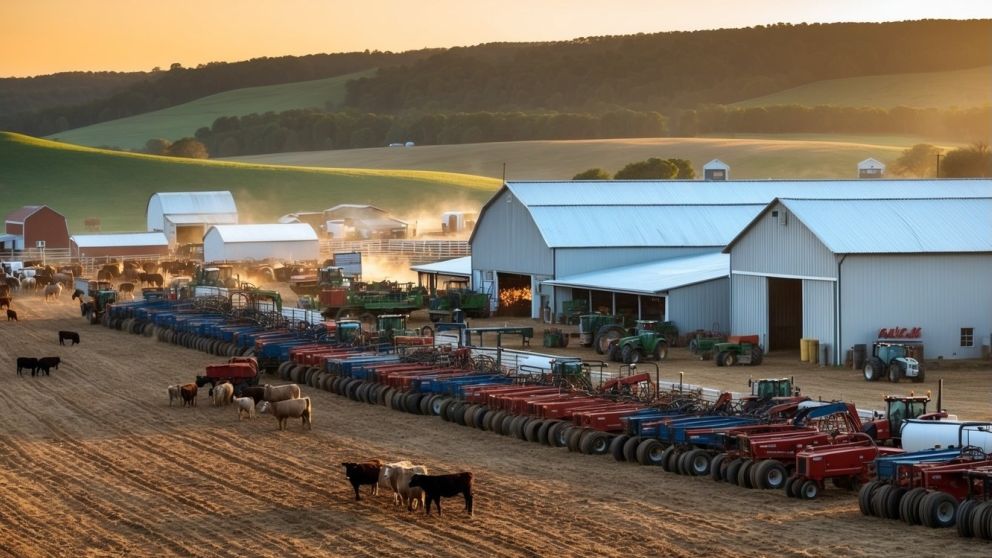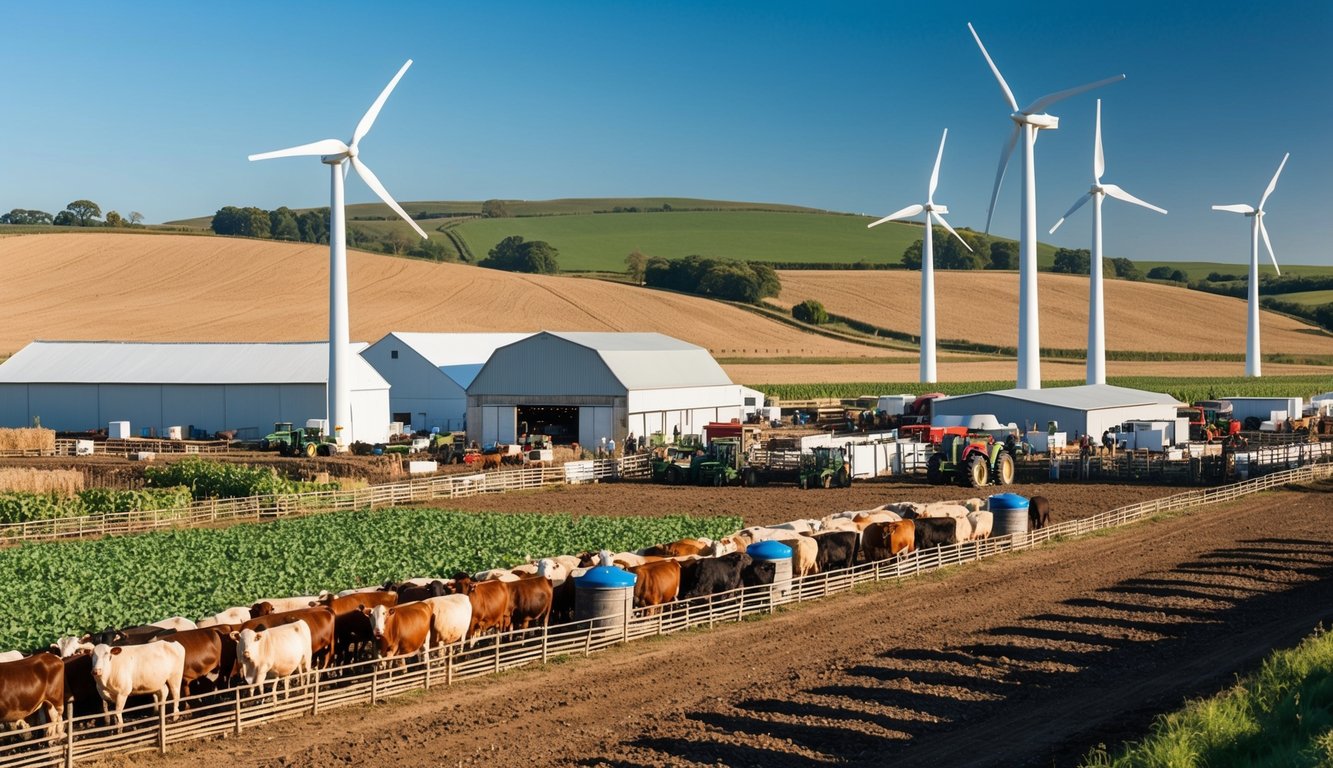2025 Outlook: The Future of Farm Sales and Auctions in Northern Alabama and Southern Tennessee

Farm sales and auctions in Northern Alabama and Southern Tennessee are set to undergo significant changes in 2025. The agricultural landscape is shifting, driven by new technologies and changing buyer preferences.
Farm auctions are expected to see a 15-20% increase in online participation, making it easier for buyers nationwide to bid on local properties.
[A bustling farm auction with rows of equipment and livestock, surrounded by rolling hills and barns in the distance]
The region's farm sales market is adapting to meet the needs of a new generation of farmers. Young buyers are looking for sustainable and tech-ready farms, pushing sellers to upgrade their properties.
This trend is reshaping the types of high-demand farms and how they are marketed and sold. Economic factors will play a big role in shaping the outlook for 2025.
Cash rent negotiations for 2025 are already underway, reflecting a proactive approach by farmers and landowners.
The market is adjusting to changing interest rates and crop prices, which will affect both buyers' purchasing power and sellers' expectations.
Key Takeaways
- Online farm auctions will significantly increase participation across Northern Alabama and Southern Tennessee.
- Young farmers are driving demand for sustainable and technologically advanced agricultural properties.
- Economic factors and early cash rent negotiations are shaping the 2025 farm sales landscape.
Technological Advancements In Farm Sales And Auctions

New technologies are reshaping farm sales and auctions in Northern Alabama and Southern Tennessee. These innovations are making transactions more efficient, secure, and data-driven.
Virtual And Augmented Reality Farm Tours
Virtual reality (VR) and augmented reality (AR) are changing how potential buyers view farms. These technologies allow detailed remote tours of properties.
VR headsets give buyers immersive 360-degree views of fields, barns, and equipment. They can "walk" through a farm from anywhere in the world.
AR overlays digital information onto real-world views. Buyers can use their phones to view crop yield data or soil quality information while inspecting fields.
These tools help buyers make informed decisions without traveling and allow sellers to showcase their farms to a wider audience.
Blockchain Technology For Secure Transactions
Blockchain technology is making farm sales and auctions more secure and transparent. It creates an unalterable record of transactions.
Smart contracts on blockchain platforms automate and enforce agreement terms, reducing the need for intermediaries and lowering costs.
Blockchain also helps track the provenance of farm assets. Buyers can verify the history and ownership of land, equipment, and livestock.
This technology builds trust between buyers and sellers. It also speeds up the sale process by reducing paperwork and verification times.
AI-Powered Predictive Analytics For Farm Valuation
Artificial intelligence is revolutionizing farm valuation. AI algorithms analyze vast amounts of data to predict farm values accurately.
These systems consider factors like soil quality, climate patterns, and market trends. They can also factor in local economic conditions and future projections.
AI-powered platforms provide real-time valuation updates. This helps sellers price their farms competitively, and buyers make informed offers.
Predictive analytics also help forecast future farm performance. This gives buyers insight into potential returns on their investment.
Changing Demographics Of Farm Buyers

[A bustling farm auction with diverse buyers in a rural setting with rolling hills and farmland stretching into the distance]
The landscape of farm ownership in Northern Alabama and Southern Tennessee is shifting. New groups are entering the market, bringing fresh perspectives and resources to rural communities.
Increase In Millennial And Gen Z Farmers
Young farmers are making their mark in the South. Millennial Farmers in the South are adopting innovative techniques to boost farm productivity. They focus on sustainable practices and technology integration.
These younger generations often seek smaller parcels for specialty crops or organic farming. They're more likely to use social media for marketing and direct-to-consumer sales.
Many are first-generation farmers drawn to agriculture as a career change. They face land access and financing challenges but bring enthusiasm and new ideas to the industry.
Rise Of Corporate Farming Entities
Corporate Farming Expansion is reshaping the local agricultural landscape. Large companies are investing in farmland across the region.
These entities often focus on economies of scale and advanced technology. They may lease land to local farmers or operate large-scale production facilities.
Corporate farms can bring significant capital to rural areas, improving infrastructure and creating job opportunities. However, this can also raise concerns about land consolidation and the future of family farms.
Growing Interest From Urban Investors
Urban investors are increasingly eyeing rural properties. They see farmland as a stable, long-term investment opportunity.
Some urban buyers are interested in hobby farms or weekend retreats. Others view agriculture as a diversification strategy for their investment portfolios.
This trend is driving up land prices in some areas. It's also bringing new ideas and resources to farming communities. Urban investors often partner with local farmers to manage the land, creating new business models.
Their involvement can lead to increased conservation efforts and agritourism initiatives. This helps preserve farmland while creating additional income streams for rural communities.
Sustainability And Environmental Considerations

[A bustling farm auction with diverse crops and livestock, surrounded by rolling hills and wind turbines, under a clear blue sky]
Farm sustainability and environmental factors are becoming crucial in shaping the agricultural landscape of Northern Alabama and southern Tennessee. These elements significantly influence farm sales, auctions, and overall land valuations.
Demand For Eco-Friendly Farming Practices
Buyers are showing increased interest in farms that use sustainable methods. This trend is driving up prices for properties with established eco-friendly practices. Farms using cover crops, no-till farming, and integrated pest management are seeing higher demand.
Organic certification is also becoming a valuable asset. Farms certified organic or transitioning to organic are fetching premium prices at auctions. This reflects consumers' growing preference for organic produce.
Water conservation methods are another selling point. Farms with efficient irrigation systems or rainwater harvesting setups are attracting more buyers. These features are especially important in areas prone to drought.
Impact Of Climate Change On Farm Valuations
Climate change is altering farm values in complex ways. Farms in areas with changing rainfall patterns may see lower valuations. However, some regions are benefiting from longer growing seasons.
Extreme weather events are a growing concern. Farms with flood protection or drought-resistant crops are considered less risky investments, leading to higher valuations for well-prepared properties.
Soil health is becoming a key factor in farm assessments. Farms with rich, carbon-sequestering soils are viewed more favorably, partly because they are resilient to climate change.
Emergence Of Carbon Credit Markets For Farmland
Carbon credit markets are creating new income streams for farmers, which is influencing farm sales and auctions in the region. Buyers are considering farmland's potential for carbon sequestration.
Farms with high carbon storage capacity are becoming more valuable. This includes properties with large forested areas or those using regenerative agriculture practices. These farms can potentially earn additional income through carbon credits.
Government incentives for carbon sequestration are also affecting the market. Buyers are increasingly interested in farms eligible for these programs, and this trend is expected to grow as carbon markets develop.
Explore premium farm listings and auctions with Underwood Land Company. Find sustainable and tech-ready farms tailored to modern farming needs. Start your journey today—visit our website!
Economic Factors Influencing Farm Sales
Key economic forces will shape farm sales in Northern Alabama and Southern Tennessee in 2025. These include shifts in commodity prices, changes to international trade policies, and updates to government support programs.
Projected Commodity Price Trends
Commodity prices are expected to decline in 2025, putting pressure on farm incomes. Corn prices may see a significant drop, impacting many local farms. Soybean and cotton prices are also forecast to decrease.
This downward trend will likely affect land values in the region. Farms focused on these crops may see reduced interest from buyers.
Some specialty crops grown in the area could buck this trend. Niche markets for organic produce or locally sourced foods may provide opportunities for higher returns.
Impact Of Global Trade Policies
International trade agreements will be crucial in shaping the local farm market. Changes in agricultural exports could significantly impact farm profitability and sales.
Ongoing trade tensions with China may continue to affect soybean exports from the region. This could depress prices and make some farms less attractive to buyers.
New trade deals with emerging markets could open up fresh opportunities. Farms able to pivot to in-demand export crops may see increased value.
Evolution Of Government Subsidies And Support Programs
Government support will remain a key factor in farm viability and sales. Changes to subsidy programs could alter the financial landscape for many local farms.
Net farm income will fall to its lowest level in nearly a decade, which may increase farmers' reliance on government support programs.
New environmental initiatives could offer additional funding streams. Farms adopting sustainable practices may attract buyers interested in long-term viability.
Changes to crop insurance programs could impact risk management strategies. This may influence buyer perceptions of different farm types and locations.
The Role Of Auctions In 2025
Farm auctions will evolve significantly by 2025. New technologies and changing market demands will reshape how agricultural assets are bought and sold. These innovations aim to benefit both buyers and sellers in the farming community.
Hybrid Online-Offline Auction Models
In 2025, farm auctions will combine digital and in-person experiences. Bidders can attend in person or join remotely through live video streams, expanding the pool of potential buyers.
Online bidding platforms will become more sophisticated. They'll offer 360-degree views of equipment and virtual farm tours. These features will help remote bidders make informed decisions.
Local auctioneers will still play a crucial role. They'll provide on-site expertise and build trust with the community. Their knowledge of regional farming practices will remain valuable.
Increased Transparency Through Real-Time Bidding Data
In 2025, real-time data will transform farm auctions. Digital platforms will instantly display current bid amounts, the number of bidders, and price trends.
This transparency will help farmers gauge market values more accurately. Moreover, buyers will be able to make smarter decisions with access to live pricing information.
Auction houses will use this data to optimize their sales strategies. They may adjust reserve prices or lot orders based on real-time bidder interest.
Specialized Auctions For Niche Agricultural Sectors
By 2025, niche farm auctions will gain popularity. These events will focus on specific sectors like organic farming, precision agriculture, or rare livestock breeds.
Specialized auctions will attract targeted buyers and potentially fetch higher prices. For example, an auction might feature only certified organic equipment or heritage seed varieties.
These niche events often include educational components. Experts may give talks on emerging farming techniques or new crop varieties, adding value that will draw both buyers and sellers to these focused auctions.
Legal And Regulatory Changes
Farm sales and auctions in Northern Alabama and Southern Tennessee face new legal and regulatory challenges in 2025. These changes impact land use, foreign ownership, and inheritance laws.
Updates To Land Use And Zoning Laws
Tennessee Agricultural Zoning Changes are reshaping the landscape for farmers. New rules allow more flexibility for agritourism activities on farmland. This opens doors for farmers to diversify their income through on-farm events and attractions.
In Northern Alabama, stricter environmental regulations affect land use. Farmers must now implement enhanced soil conservation practices. This includes wider buffer zones near waterways and stricter controls on pesticide use.
Both states have introduced new permits for large-scale livestock operations. These aim to manage odor and waste more effectively. Small family farms are largely exempt, but larger operations face increased scrutiny.
New Regulations For Foreign Ownership Of Farmland
Concerns over food security have led to tighter controls on foreign ownership of farmland. Alabama has capped foreign ownership at 5% of total farmland in any county. Tennessee requires detailed disclosures for any foreign investment in agricultural land.
New screening processes are in place for farm sales to non-U.S. entities. Local review boards now assess the impact of foreign purchases on rural communities. This process can delay sales by several months.
Some counties have gone further, banning foreign ownership outright. This has created a patchwork of regulations across the region. Farmers and auction houses must now navigate these complex rules carefully.
Potential Changes In Inheritance And Estate Tax Laws
Farm Inheritance Planning has become more crucial with looming changes to estate tax laws. The federal estate tax exemption is set to decrease in 2026. This could impact many family farms in the region.
Both Alabama and Tennessee are considering new state-level inheritance taxes. These would apply to large farm estates, potentially forcing some families to sell land to pay the tax bill.
New "special use valuation" rules may offer some relief. These allow farm heirs to value land based on agricultural use rather than market value. This can significantly reduce the tax burden for qualifying farms.
The Impact Of Urban Sprawl
Urban sprawl is changing the landscape of Northern Alabama and southern Tennessee. It is putting pressure on farmland but also creating new opportunities for farmers.
Pressure On Farmland Near Expanding Cities
Cities like Huntsville and Chattanooga are growing fast, and this growth is consuming farmland around them. As land values rise, farmers face tough choices.
Some sell their farms for big profits. Others struggle to keep farming as taxes and costs go up.
Urban sprawl isn't just about losing land. It changes how farms work. New neighbors may complain about farm noise or smells. This can make it harder to farm normally.
Water use becomes an issue, too. Growing cities need more water, which can limit the amount available for crops. Traffic also increases, making it tougher to move farm equipment on the roads.
Opportunities For Agritourism And Direct-To-Consumer Sales
Urban sprawl brings challenges but also chances for smart farmers. More people nearby means more customers for farm products. Many city folks want to connect with where their food comes from.
Agritourism is growing in Alabama. Farms offer things like:
- Corn mazes and pumpkin patches
- Farm-to-table dinners
- Pick-your-own fruit orchards
- Farm stays and educational tours
These activities can bring in extra income and help people understand farming better.
Farmers' markets and roadside stands do well near cities. People like fresh, local food. Some farms even start CSA (Community Supported Agriculture) programs. These let customers buy shares of the harvest.
Strategies For Preserving Agricultural Land
Keeping farmland as farms is crucial. Both Alabama and Tennessee have programs to help. These include:
- Conservation easements
- Tax breaks for keeping land in agriculture
- Zoning laws to protect farmland
Some counties use "right-to-farm" laws, which protect farmers from nuisance complaints from new neighbors. Urban growth boundaries can also help limit sprawl.
Farmers are getting creative, too. Some form land trusts to buy and protect farmland. Others work with cities to create green belts of protected land.
Education is key. Helping people understand why local farms matter can build support for preservation. Farm tours and school programs play a big role in this.
Don’t miss the 2025 farm auction opportunities with Underwood Land Company. Discover eco-friendly and innovative agricultural properties that meet your goals. Contact us today to learn more!
Frequently Asked Questions
How does technological advancement influence farm sales and auctions in Northern Alabama and Southern Tennessee?
Digital platforms are transforming farm auctions in the area. Online bidding systems allow buyers nationwide to participate in local sales.
Drone technology is being used to create detailed property maps and virtual tours. This helps potential buyers assess land quality and value without visiting in person.
What are the predicted market trends for agricultural land values in Northern Alabama and Southern Tennessee in the coming year?
Experts predict a slight increase in agricultural land values for 2025. This is due to growing demand for farmland and limited regional supply.
Corn and soybean prices are expected to remain stable, supporting land values. However, rising interest rates may temper price growth in some areas.
What role do local farm cooperatives play in shaping the area's future of farm sales and auctions?
Farm cooperatives are becoming more involved in land transactions. They often act as intermediaries, helping connect buyers and sellers.
Some cooperatives offer members financial services, making it easier for farmers to purchase additional land at auctions.
What are the major factors driving changes in the farm economy of Northern Alabama and Southern Tennessee for 2025?
Trade policies are expected to impact crop prices and farm profitability. Changes in international markets could affect local farm sales.
Climate variability is a growing concern. Farmers are adapting their practices to maintain productivity, which influences land values.
How are changing environmental regulations expected to impact regional farm sales and auctions?
New water conservation rules may affect land use in some areas. This could influence the types of crops grown and overall farm profitability.
Carbon credit programs are gaining traction. Farms with sustainable practices may see increased value at auction.
What strategies are farmers in Northern Alabama and Southern Tennessee adopting to enhance the marketability of their lands at auctions?
Many farmers are investing in soil health improvements. This strategy can increase land productivity and value.
Some landowners are diversifying their operations to include agritourism. This added income stream can make properties more attractive to buyers.



